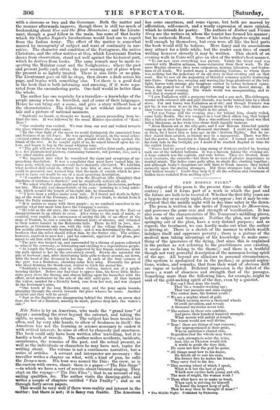THE MIDDLE NIGHT. * THE subject of this poem is the
present time—the middle of the
century ; and it forms part of a work in which the past and the future are both to be treated of. Whether the first fifty years are a bygone day or an early night, does not appear ; but it may be con- jectured that the middle night will in due time usher in the dawn.
The poem is written in the metre of Tennyson's In Menwriam,
and possesses the same ease and strength of versification. It has
also some of the characteristics of Mr. Tennyson's middling pieces,
both in subject and treatment. Neither the plan, nor the parts springing out of the plan, have a very distinct purpose ; and as regards the treatment, we can hardly make out what the author is driving at. There is a sketch of the manner in which wealth indulges itself and oppresses poverty ; there is a picture of the medical man taking advantage of his knowledge to make some-
thing of the ignorance of the dying, (but since this is explained in the preface as not referring to the practitioners now existing,
it seems not to belong to the theme) ; and there is a truthful though not very powerful description of the mammon-loving spirit of the age. All beyond are allusions to personal circumstances, (the egotism is apologized for in the preface,) or general aspira- tions, wishes, and remarks, that from their want of obvious drift are vague or isolated. Deficient impression is the defect of the poem ; a want of closeness and strength that of the passages. Something more than the following lines, for example, might be said of the gold-seeking spirit of the day, even by a quietist.
" But can I then deny the truth,
That 't-is a wonder-working age ;
That vast pursuits and aims engage The coolest man, the hottest youth ?
" We see a mighty wheel of gold, Which turning moves a thousand wheels Of swift invention, and reveals A thousand mysteries never told.
" The nations in these arts combine, And prose their hundred hundred strength : What secrets will unfold at length, The wisest would not well divine.
" True! these are things of vast concern ; Nor unproportioned is their pride, Who in ambition's chariot ride, Regardless that the wheels may burn.
"For each attempts to seize the reins, And, like as Phieton would risk A world to guide the fiery disk, He cares not how the goal he gains.
" All things must bow to his desire, He fitteth all to suit his ends, His former foes he makes his friends, They carry fuel to his fire.
" This moving wheel of which I speak, What is it but the lust of gold, Which now excites both young and old, The man of might, the woman weak ?
" Then what have we to make us boast, When each is striving for himself
To hoard the largest striving of pelf,
That he may then be thought of most ? "
• The Middle Night. Published hg Pickering.


























 Previous page
Previous page